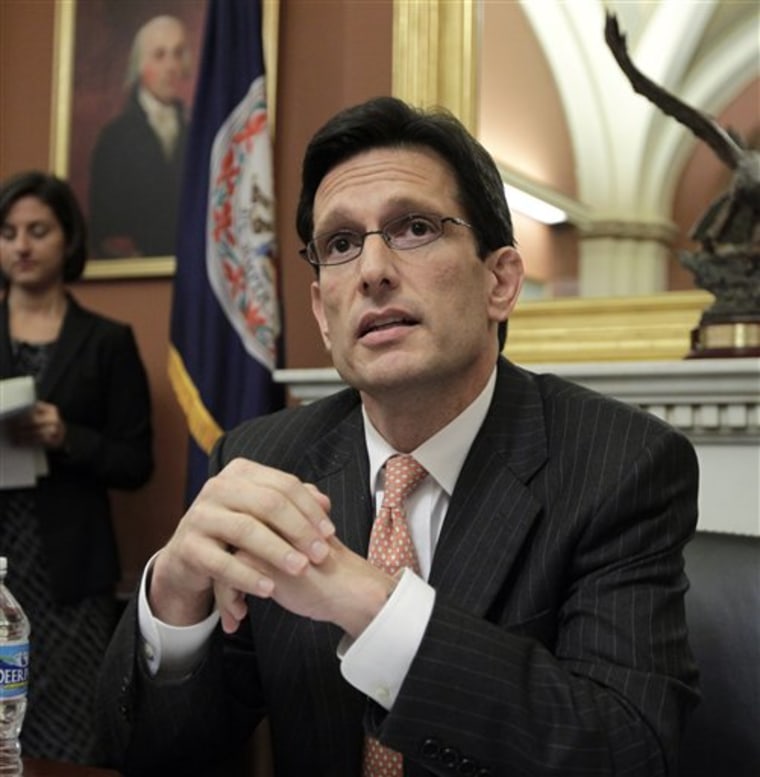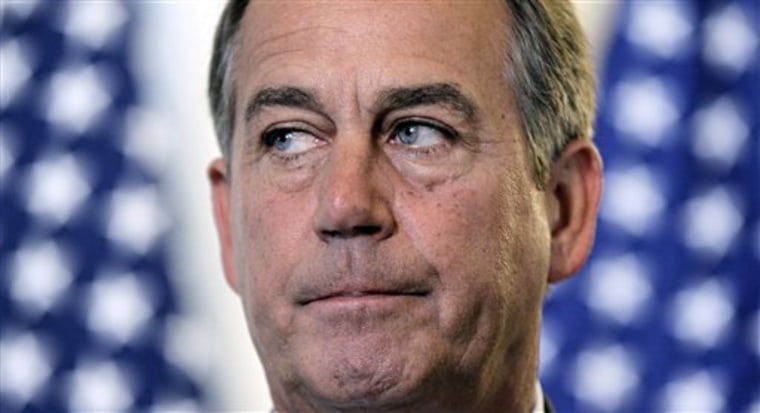New House Speaker John Boehner doesn't have as many millions as his predecessor, Nancy Pelosi, but like many new committee chairmen and other leaders, he has holdings in companies that have major financial stakes in the actions of Congress.
For Boehner, that includes a portfolio of stocks in oil companies, financial firms, communication companies and pharmaceuticals. Holdings among other lawmakers include farmland, real estate and investments in high tech companies.
None of this is violates congressional ethics rules. The rules state that members can't use their official positions for personal gain and limits to $26,100 what they can earn as a director of a business or for actual work performed outside Congress. They, however, do not limit personal investments, a source of considerable wealth for many lawmakers.
Boehner, a Republican and son of an Ohio bar owner, derives much of his nest egg from his career as a small businessman before coming to Congress more than two decades ago, said his spokesman, Michael Steel, "Boehner's day-to-day investment decisions are made by a professional financial adviser. He is not consulted on individual transactions," Steel said.
Likewise, Judiciary Committee Chairman Lamar Smith, R-Texas, said an account manager makes all the decisions for a portfolio of more than $1 million that he and his wife hold. He made 599 trades last year involving companies such as Apple Computer, Microsoft, Dreamworks Animation and Lockheed Martin.
In 2009, Boehner sold a retirement plan in the plastics company he once ran, taking in between $1 million and $5 million. He then purchased shares in almost 60 companies, including stock in BP, Exxon, Chevron, ConocoPhilips and Occidental. His holdings in each of them are valued at between $15,000 and $50,000.
In 2010, he listed 121 transactions in which he bought or sold investments. He listed as major assets four mutual and IRA funds worth between $100,001 and $250,000 each and 12 investments valued from $50,001 to $100,000 each.
All members of Congress must file the annual forms that list their major sources of earned and unearned income, primary assets and liabilities and privately funded gifts. In 2010 rank-and-file members received salaries of $174,000. As speaker last year, Pelosi received $223,500 and House and Senate majority and minority leaders got $193,400.
Boehner's wealth pales compared to that of the House's chief investigator, Oversight and Government Reform Committee chairman Darrell Issa, R-Calif.
Issa, who invented the Viper car alarm system, is among the richest members of Congress with holdings of at least $150 million and possibly approaching $500 million. This year Issa reported two investments that were each worth more than $50 million, a Putnam High Yield Trust Fund and a company that owns and manages properties in five California cities and Cincinnati. He lists four other mutual funds or holdings in property companies worth $25 million to $50 million each. Issa's jurisdiction as the oversight committee chairman is so vast that it could potentially conflict with almost any source of income, and Issa avoids any appearance of a problem by not owning individual stocks.

His disclosure form included mention of $825 from each of two appearances on the Bill Maher show that he donated to charity.
Former Speaker Pelosi, D-Calif., now the House's minority leader, also makes the perennial lists of Congress's richest. Much of her family's wealth is listed to her husband, Paul, including a commercial property in San Francisco valued between $5 million and $25 million. She reports as assets joint ownership with her husband of a home and vineyard in St. Helena, Calif., valued at between $5 million and $25 million. She's also a limited partner in residential real estate in Sacramento in the $5 million-$25 million range.
Her husband reported capital gains of $1 million to $5 million last year from a sale of stock in Apple Inc.
Lawmakers are not required to provide details of their spouses' business dealings, and in some cases these can be substantial.
Financial Services Committee Chairman Spencer Bachus, R-Ala., lists his most valuable assets as belonging to his wife, including an annuity from the Pacific Life Insurance Co. worth between $250,000 and $500,000.
Rep. John Kline, R-Minn., chairman of the House Education and Work Force Committee, lists as major assets four mutual funds each valued at less than $15,000, but notes that his wife owns a 534-acre farm in Houston, Minn., valued $100,000 to $250,000.
Rep. Paul Ryan of Wisconsin, the new Budget Committee chairman and the GOP's point man on cutting government spending, says his biggest asset is a 20 percent interest in the Ryan-Hutter Investment Partnership worth $250,001 to $500,000. He also has a college savings plan for his son worth between $100,000 and $250,000. His wife Janna is a partner in mining and oil companies in Madill, Okla.
The ascension of Rep. Doc Hastings, R-Wash., to chair the Natural Resources Committee, was also a natural step for a person who used to run his family's paper supply business. He lists as a major asset a trust fund with his family's Columbia Basin Paper and Supply Co. worth between $500,000 and $1 million.
Of the two Senate leaders, Majority Leader Harry Reid, D-Nev., is a landholder, claiming 160 acres in Bullhead City, Ariz., worth between $1,000,001 and $5 million and controlling interest in 47 acres in mining claims worth $250,001 to $500,000. While he doesn't list any holdings of individual companies, his investment funds include some focusing on the health care, technology, financial, telecommunications and utilities sectors.
Senate Republican leader Mitch McConnell of Kentucky has jointly held money market and other accounts worth $5,000,001 to $25 million and two other money market funds in the $1,000,001 to $5 million range. His wife Elaine Chao served as labor secretary under President George W. Bush and last year received a salary from The Heritage Foundation.
The second-ranked Senate Republican, Jon Kyl of Arizona, went far beyond the letter of the disclosure law, providing detailed statements from his IRA custodians of the actual value of his accounts as well as a listing of all asset sales and purchases. He said he had three Individual Retirement Accounts worth $641,900.
The forms also showed that Rep. Charles Rangel, D-N.Y., former chairman of the tax-writing Ways and Means Committee, sold his villa in Punta Cana, Dominican Republic for $250,001 to $500,000. Rangel's failure to pay taxes on income from the villa was among the ethics violations that led to his censure by the House last year.
Not all lawmakers are wealthy. Senate Agriculture, Nutrition and Forestry Chairman Debbie Stabenow, D-Mich., said she earned $64,919 from a Michigan legislative pension program but has no major assets or sources of unearned income.
Among those seeking extensions for filing their forms were no. 2 Senate Democrat Dick Durbin of Illinois, House Ways and Means Committee Chairman Dave Camp, R-Mich., House Appropriations Committee Chairman Hal Rogers, R-Ky., and GOP presidential hopeful Michele Bachmann, R-Minn.
